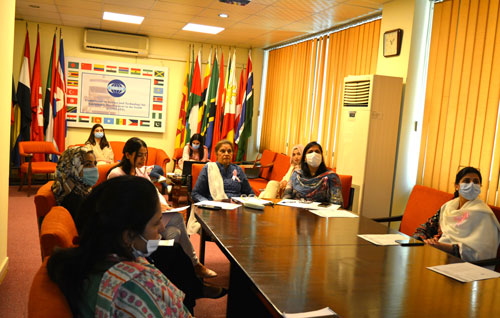Staff Reporter
RESEARCH shows that Pakistan has the highest rate of breast cancer than any other Asian country as approximately 90,000 new cases are diagnosed every year out of which 40,000 succumb to the disease. Estimates say 1 in 10 women may develop Breast Cancer in their lifetime in Pakistan. The situation is not much different in other developing countries.
An ardent advocate of socio-economic well-being of populations, the Commission on Science and Technology for Sustainable Development in the South (COMSATS) highlighted this global health issue by holding a webinar on “Breast Cancer Awareness: Give Hope, Save Lives” today in Islamabad at its Secretariat, contributing to the global campaign of necessary awareness raising. Held virtually owing to the Covid-19 concerns, the webinar was joined by experts and participants online.
Speaking on the occasion, Ambassador (Retd.) Fauzia Nasreen (Advisor at COMSATS) emphasized on the measures that should be taken for overcoming lack of knowledge, appropriate facilities, family support and fear related to cancer in our society. She remarked that early diagnosis, access to proper medical facilities, affordable and timely care are the cornerstones of breast cancer control. She warned to take breast cancer seriously and learn about the techniques of self-diagnosis for an early detection of the disease.
Dr. Samina Naeem, ex-Associate Prof of Health Services Academy, and consultant at WHO, Pakistan, gave a comprehensive overview of the disease and stressed upon the importance of breaking the stereotypes and taboos related to it.
A survivor’s perspective also came from Dr. Fauzia Cheema, who shared the story of her experience of battling breast cancer from a point of view of a doctor facing the disease. Hers was an educational account and objective overview of healthcare system’s problems related to treatment of the disease and related social and psychological aspects.
In her keynote address, Dr. Farheen Raza, from Radiology Department of PIMS Hospital Islamabad, emphasized on screening and the need to have community-based health education component including focused and small group discussions to overcome the social taboos and stigma attached to female illnesses. It was informed that the Federal Breast Cancer Screening Center (FBCSC) is the first ever public facility located inside Pakistan Institute of Medical Sciences (PIMS) that offers free screening mammography for women of all socio-economic strata and is a walk-in facility. She proposed a one stop breast cancer clinic with aim to answer financial, cultural, mental and physical needs of women all under one roof as one of the ways forward towards reducing breast cancer.
From COMSATS Headquarters and Coordinator of the session, Dr. Azeem Fareed, opined that awareness is not only needed among women but also among men as they are part of the family and are equal part of the recovery journey. As a part of the pioneer team of telehealth in Pakistan, she also hoped to initiate tele-medicine training for medical practitioners in remote areas for helping to address the issue nationwide.









